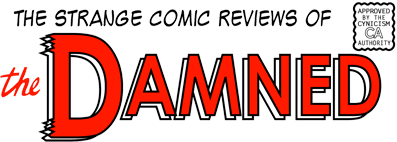

The King
by Rich Koslowski
I am torn by my reaction to The King. On the one hand, it's hard not to admire the evolution of Koslowski's style. Three Fingers was a cute book that seemed slightly attenuated in the full-length format. The King is far more assured and substantial narrative. Although the art is noticeably less intricate and detail-rich than what we saw in Three Fingers, I think this was a conscious decision made for the book's readability and pacing. The King is a solid chunk of book, over two hundred pages, and it is to Koslowski's credit that the story occupies exactly as much space as it needs, no more or less, and every narrative beat is laid out with perfect aplomb.
The basic plot details the career of a mysterious and charismatic Elvis impersonator who surfaces in Las Vegas, wearing a golden helmet to insure his anonymity. Within weeks of his appearance the faithful flock to the seeming resurrection of their idol, as word of his electrifying sold-out performances spreads across the country -- is it really him, back from the dead after all these years? Finally, Time magazine sends a reporter to investigate, a man with every reason to want to uncover whatever sordid truth lies behind the seemingly impossible reappearance of Elvis Presley.

But as I said, I'm torn. On the one hand, we have a well-constructed pseudo-mystery that explores the nature of faith. But on the other hand, we have a two-hundred page book about Elvis impersonators. My problem with The King is essentially identical to another problem I had with Three Fingers: Koslowski has obviously spent a great deal of effort constructing a well-reasoned and extremely clever thematic undercarriage for what is in actuality a very silly story. Three Fingers was a story about race and the politics of entertainment in America throughout the twentieth century, and the ways that "authentic" ethnic identities are co-opted and twisted by history and money -- but all these ideas were wrapped around a too-clever-by-half Roger Rabbit pastiche that was just too silly to support the weight of "real world" ideas for any length of time. Similarly, with The King Koslowski has wrapped an extremely thought-provoking kernel of an idea within the unbelievably goofy context of Elvis fandom.

To Koslowski's credit, the overriding ideas come through fairly well despite the "Blue Suede Shoe" trappings. Faith is a prickly subject. The King is probably the best Elvis-themed exploration of Kierkegaard's "Leap of Faith" extant (although I could always be wrong). As the plot unfolds and the details of the faux-Elvis' background are teasingly unveiled, the book's central questions take shape: If faith is dependent on mystery, can incontrovertible proof destroy faith? If faith is a positive force in society, should self-proclaimed rationalists have the right to challenge faith on the grounds of empiricism?
The reporter at the heart of the book faces the dilemma of exposing the King's (probably) true and sordid past, or letting the legend itself live and inspire those who choose to believe. This is a conflict that cuts to the core of modern society's worse divisions. I am not entirely sure wether or not The King comes down on the right side of this divide, from my perspective. I'm very much a dyed-in-the-wool rationalist. I don't believe that faith for faith's sake is a positive virtue. I believe that all the Christian existentialists' arguments for the acceptance of supernatural providence, which must by definition exist independent of reason or evidence, are, at best, sheer sophistry. But regardless of whether or not I agree with the book's ending, great pains are taken to build up a rational framework for the final decisions. At the very least, Koslowski doesn't try to sugar-coat the gravity of the dilemma, even if it comes garbed in questionable clothes. (And to his credit, he also places a few scattered hints that the whole thing is just a P.T. Barnum-esque ploy on the part of a mischievous and manipulative Elvis. This seed of doubt is enough to keep the book's ending appropriately ambiguous.) The book is built around a mystery but the only conclusions we are offered are themselves inconclusive, so even those who wish to accept the most rational explanation must exercise a bit of faith in the matter.

As much as I wish I could dismiss the book based simply on the silly trappings of Elvis kitsch, The King is simply too richly-constructed a work to ignore. I will say that, as with Three Fingers, the goofy window-dressing makes appreciating the book's virtues a more difficult proposition than it should be. A good book should require work on the reader's part, but it shouldn't be a matter of great exertion merely to overlook the premise (see Cerebus for the best example of this principle). However -- The King shows enough of a marked improvement over Three Fingers as to make me believe that Koslowski's next project may be even better. He's come a long way since the modest virtues of The 3 Geeks / Geeksville, and has taken to the full-length graphic novel format with a surprising confidence. I think, based on the evidence of this book, he's close to making the final step that'll demarcate his juvenalia from the fully-formed work whose outlines we can faintly see already taking shape in the pages of The King.





No comments :
Post a Comment